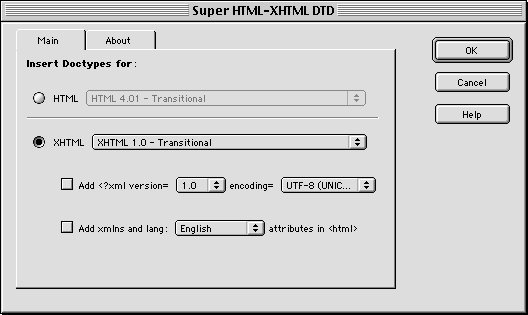Super HTML-XHTML DTD
Super HTML-XHTML DTD is an
extension to add DOCTYPE declarations for HTML or XHTML. If you choose
XHTML you have more options available...
Latest news about Super HTML-XHTML DTD:
- Version 1.0.0 has been sent for approval (4/05/2001).
- Version 2.1.0 has been posted.
- Version 2.2.0 has been posted (8/06/2001).
- More than 18.000 downloads (7/01/2004).
Help for Super HTML-XHTML DTD:
General Notes:
- Access from the Commands>Dreamwarrior> Super HTML-XHTML
DTD.
About the Doctypes:
The actual syntax of HTML is very well defined by a document type
definition (DTD). In fact, all files should begin with a <!DOCTYPE> declaration,
which is used to indicate the particular version of HTML being employed
in a page. You might recall noticing them at the top of the source
of many Web pages. This section lists the most common HTML DTD indicators.
HTML 2.0
This version of HTML is equivalent to what is supported by early versions
of Netscape and mostly many presentation features of HTML that developers
rely on. Few sites use strictly HTML 2.0 given its limited capabilities.
HTML 3.2
This version of HTML is similar to what is supported by 3.x.x - generation
browsers. Many of the acceptable browser- introduced proprietary tags were
adopted for this version of HTML.
HTML 4.0 - Transitional
The transitional version of HTML 4.0 is roughly equivalent to what 4.x.x
- generation browsers support. However, no single browser at the time of
this book's writing is fully HTML 4.0 compliant despite the specification
having been out for approaching three years. The transitional form of HTML
4 preserves most of the presentational markup aspects commonly employed by
Web designers.
HTML 4.0 - Frameset
The frameset DTD is an auxiliary definition to deal with the use of frames
in a document. It only defines the frame syntax and otherwise relies on the
transitional DTD.
HTML 4.0 - Strict
The strict version of HTML 4 removes nearly all the presentation presentation-oriented
markup elements in favor of using CSS for page formatting. This greatly simplifies
the language, but it forces the developer to rely on CSS that is not properly
supported in 4.x- and even 5.x.x-generation browsers.
HTML 4.01 - Transitional
A minor update release of the 4.0 specification that addresses errors and
oversights in the original release.
HTML 4.01 - Frameset
The update release of the frameset auxiliary DTD.
HTML 4.01 - Strict
A minor update release of the 4.0 strict specification that addresses errors
and oversights in the original 4.0 specification.
XHTML 1.0 - Transitional
The XHTML 1.0 version of the HTML 4 transitional specification.
XHTML 1.0 - Strict
The XHTML 1.0 version of the HTML 4 strict specification.
XHTML 1.0 - Frameset
The XHTML 1.0 version of the HTML 4 frameset specification.
XHTML 1.1
Based on the XHTML 1.0 Strict.
Insert doctypes for HTML: Insert next doctypes for HTML:
HTML 2.0, 3.2, 4.0 (transitional, frameset, strict) or 4.01 (transitional,
frameset, strict).
Insert doctypes for XHTML: Insert next doctypes for
XHTML:
XHTML 1.0 (transitional, frameset, strict) or 1.1.
Add: <?xml version....: Insert next code:
<?xml version="1.0" encoding="UTF-8"?>
Version will be updated when available. In the encoding option all the possible
encodings for xml are predefined.
NOTE: This line is needed for XHTML but DW4 doesn't recognize
it.
Add xmlns and...: Insert next attributes in the <html> tag:
<html xmlns="http://www.w3.org/TR/xhtml" xml:lang="en" lang="en">
You can choose the language. They are also predefined.
History:
Version 1.0.0: First public release.
Version 2.1.0: More info in the encodings list. Languages values changed
to lower case as it's a defacto standard. It avoid duplication of DOCTYPES.
It deletes XHTML attributes if you change from a XHTML to a HTML DOCTYPE.
Version 2.2.0: Added XHTML 1.1 doctype.
Download:
Super HTML-XHTML DTD 2.2.0 is available at the Macromedia
Exchange.
|


